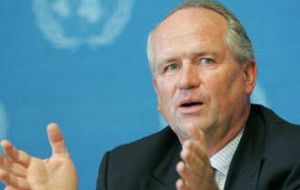MercoPress. South Atlantic News Agency
UN economic report warns of global standstill in 2008
 Dr. Heiner Flassbeck
Dr. Heiner Flassbeck Following on a robust 2007, the United Nations Conference On Trade and Development says there is a clear danger of the world economy coming to a near standstill in 2008. The report says this will hit many poor nations hard, slow world trade and put an end to the boom in commodity prices.
Heiner Flassbeck, an official at the U.N. agency says the major uncertainties for 2008 arise from the United States economy. "We have seen already a crisis in the third quarter of last year, the so-called sub-prime crisis," he noted. "This has sent some shock waves all around the world and these shock waves have had already a number of repercussions that could lead to a much worse outcome in 2008." U.N. economists say significant spillover effects from the problems in the U.S. mortgage markets have spread to major European countries and, to a lesser extent, to Japan and other developed economies. Flassbeck says the world can no longer count on the United States as being the sole locomotive of the world economy. He says Japan and Europe have to do more to take over this role. But, he adds, there is no sign yet that other major developed economies are strong enough to replace the United States as the engine of global growth. He says the world economy would suffer a severe blow if the United States were to go into recession. "Recession is a real threat, but nobody can tell whether it materializes or not at this moment of time," he added. "As I said, that is the result of uncertainty still surrounding, what is called, the sub-prime crisis because still nobody knows exactly how much additional value will have to be written off or how much additional losses will occur in the financial system as a whole in the United States and elsewhere." The U.N. report notes a 15% drop in housing prices would be likely to affect consumer demand and take 2% off U.S. growth, bringing the U.S. economy to a virtual standstill in 2008. The report also argues that the fall of the U.S. dollar is benefiting the United States by lowering its export prices and making imports higher. But, it warns the depreciation of the dollar is hurting other economies. The report says governments should take joint action to avoid a rout of the dollar and warns a rapid and disorderly descent could lead to a global recession. The report also points out that in 2007, more than 100 economies achieved 3% growth and in developing countries rose on average nearly 7%. Africa, it notes, grew by nearly 6% and is expected to exceed that figure this year.




Top Comments
Disclaimer & comment rulesCommenting for this story is now closed.
If you have a Facebook account, become a fan and comment on our Facebook Page!